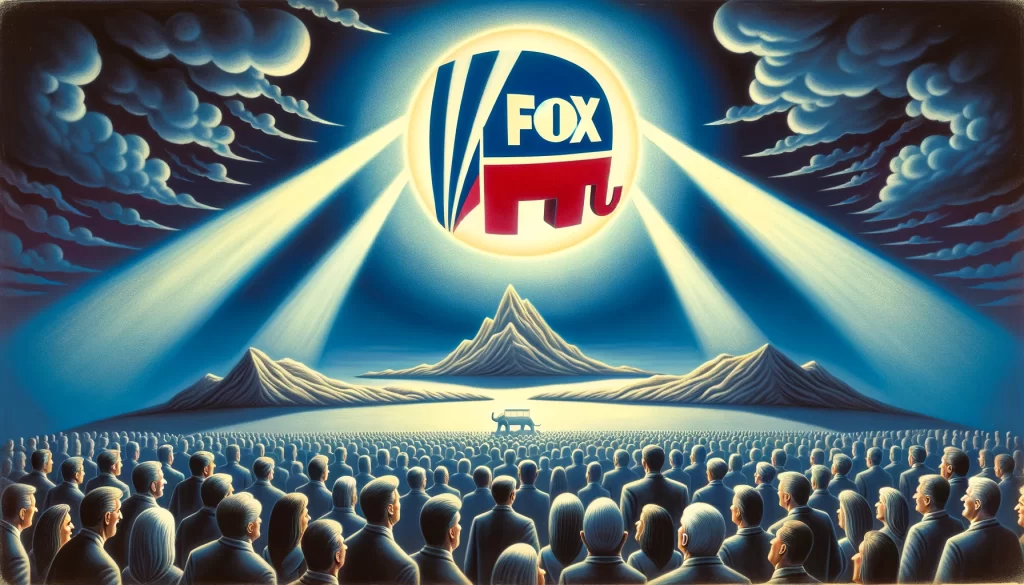Rupert Murdoch, a prominent figure in the right-wing media, has recently shown his significant influence within the Republican Party, despite not being very public about it. His media empire, which includes Fox News, The Wall Street Journal, and the New York Post, played a crucial role in a political battle involving House Speaker Mike Johnson and Representative Marjorie Taylor Greene.
Marjorie Taylor Greene launched a strong attack against Johnson for his decision to support a financial aid package for Ukraine. During this conflict, Murdoch’s media outlets not only supported Johnson but also criticized Greene harshly. The New York Post even labeled her as “MOSCOW MARJORIE” on its front page.
This situation was quite unique in the landscape of right-wing media. While Murdoch’s outlets stood by Johnson, other right-wing media sources, including personalities like Tucker Carlson, Steve Bannon, Charlie Kirk, and platforms like Breitbart and The Gateway Pundit, attacked Johnson. They portrayed him as a weak Republican who had abandoned conservative principles to cooperate with the Democratic Party.
Despite these attacks, the efforts to undermine Johnson did not succeed. On Wednesday, the House quickly voted down a resolution that would have removed Johnson from his leadership position. This failure was partly because Greene could not secure the support of key Republican figures, including Donald Trump, and also because the Democrats supported Johnson.

Fox News, part of Murdoch’s media empire, barely covered the vote, showing it only briefly as it happened. This was in stark contrast to CNN and MSNBC, which provided detailed live coverage of the event.
The situation highlighted the significant influence Rupert Murdoch still has within the Republican Party. Although his overall power has declined over the years, his media outlets continue to play a central role in shaping political narratives within the party. Without the support of Murdoch’s media, Greene’s campaign against Johnson might have gained enough momentum to threaten his position.
The outcome might have been very different if Murdoch had taken a different approach. For instance, if he had allowed or directed Fox News to intensify the criticism against Johnson, it could have made the situation much worse for the speaker. Such coverage would likely have drawn more Republicans into the fray and could have influenced Trump’s response as well.
In this scenario, Trump might have decided to oppose Johnson, influenced by what he saw on Fox News, and encouraged other Republicans to do the same. But this did not happen. Instead, Murdoch’s behind-the-scenes support helped Johnson navigate through what could have been a very challenging situation. At 93 years old, Murdoch was a crucial, yet often overlooked, ally for Johnson. In other parts of the right-wing media, Johnson was depicted as a traitor to conservative values.
This article is based on the following article:

Background Information
Armed with this background, readers will be better equipped to understand the complex interactions and power dynamics within American politics and media described in the article.
1. Left-Wing vs. Right-Wing Origins
The terms “left-wing” and “right-wing” originated during the French Revolution of 1789. In the French Estates General, the assembly that represented French citizens before the revolution, those who sat on the left side were generally opposed to the monarchy and supported revolutionary, progressive changes including the redistribution of wealth. Those on the right side were supportive of the traditional structures of power, such as the monarchy and the church. Today, these terms have evolved but still represent a basic division in political ideology:
- Left-wing: Typically supports social equality, government intervention in the economy, more robust welfare states, and progressive policies regarding social issues.
- Right-wing: Often emphasizes individual liberty, free market policies, a smaller role for government in economic life, conservative social policies, and nationalism.
2. Background on Media Outlets and Personalities Mentioned
a. Rupert Murdoch’s Media Empire
- Fox News: A cable news network founded in 1996 by Rupert Murdoch. It is known for its conservative political stance and is a major influence among right-wing audiences in the United States.
- The Wall Street Journal: An international daily newspaper also owned by Murdoch, renowned for its comprehensive coverage of business and economic news. It has a conservative editorial page, though its news reporting tends to be more neutral.
- The New York Post: A daily newspaper also owned by Murdoch, known for its sensationalist and conservative-leaning tabloid journalism.
b. Marjorie Taylor Greene
- Greene is a U.S. Representative known for her support of far-right theories and her allegiance to the more extreme factions of the Republican Party. Her controversies often make national headlines, influencing her reputation as a polarizing figure.
c. Mike Johnson
- Johnson is a U.S. Representative who, in the context of this article, served as the House Speaker. He is seen as a mainstream Republican, contrasting with more extreme party members.
d. Other Right-Wing Media Personalities and Outlets
- Tucker Carlson: A television presenter on Fox News, known for his conservative commentary and strong influence among right-wing audiences.
- Steve Bannon: Former executive chairman of Breitbart News and a chief strategist for President Donald Trump. Known for his role in the populist wing of the Republican Party.
- Charlie Kirk: Founder of Turning Point USA, a conservative advocacy group that targets young people.
- Breitbart: A far-right news website known for its provocative content and alignment with populist, conservative politics.
- The Gateway Pundit: A far-right news and opinion website known for publishing falsehoods and conspiracy theories.
3. Understanding Political Dynamics in Media
Understanding these elements is crucial for grasping how media can influence political opinions and actions. Media outlets often serve not just as news providers but as platforms for ideological battles, swaying public opinion, and even influencing political outcomes. This interplay between media and politics is a core aspect of modern democratic systems, illustrating the power of information and its control.

Debate/Essay Questions
- Does Rupert Murdoch’s control over multiple major media outlets pose a risk to unbiased political coverage? Should there be limits on the extent of media ownership to ensure a diverse range of perspectives in news coverage?
- Should politicians work to regulate media outlets more strictly to ensure fair political coverage, or would this infringe on freedom of the press?
Please subscribe to Insight Fortnight, our biweekly newsletter!
